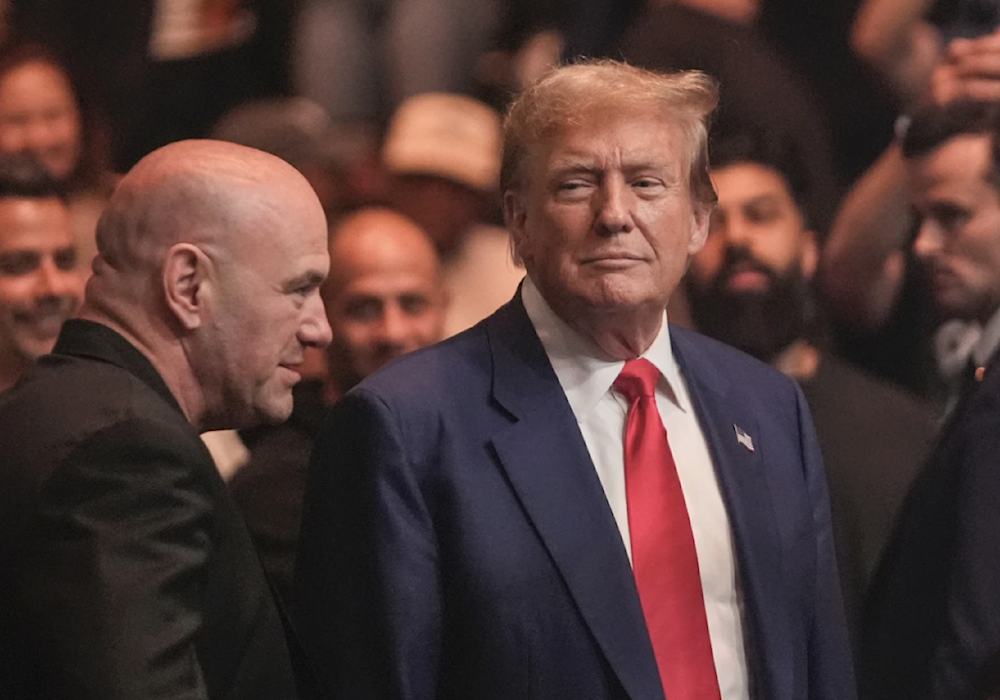Trump says Americans could reach 'breaking point' if he is jailed
Trump is slated to be sentenced on July 11, four days before Republicans publicly select their presidential nominee to fight Democratic President Joe Biden in the November election.
-

Former President Donald Trump talks to Dana White while attending the UFC 302 mixed martial arts event on June 1, 2024 in Newark, NJ. (AP)
According to former US President Donald Trump, although he would submit to house arrest or jail time after he was convicted last week, the public will find that difficult to accept.
A New York jury found Trump guilty of falsifying documents to conceal a payment made to silence an adult actress, Stormy Daniels, before the 2016 election.
During a Sunday Fox News interview, Trump claimed he was "not sure the public would stand for it," adding that "I think it'd be tough for the public to take. " Without elaborating he expressed "You know, at a certain point, there's a breaking point."
He is slated to be sentenced on July 11, four days before Republicans publicly select their presidential nominee to fight Democratic President Joe Biden in the November election.
The Republican front-runner discussed a number of important subjects in the main segments of the interview that aired on Sunday, including what he would look for in an attorney general if elected in November and whether or not he would declassify several important documents that have been the focus of rumors and conspiracy theories.
"Yes," Trump said in the Fox News interview, insisting he would declassify the 9/11, JFK and Epstein files to "restore some trust lost in American institutions."
Republic National Committee Co-Chair Lara Trump told CNN that what his supporters would do if he was imprisoned is "what they've done from the beginning, which is remain calm and protest at the ballot box on November 5th. "
The RNC and Trump campaign raised $70 million in the 48 hours following the ruling, according to Lara Trump, a number that Reuters was unable to independently confirm. When asked how much will be spent on legal bills compared to campaign expenses, she declined to comment.
On Sunday, at least one Democratic congressman voiced fear that Trump's fans may respond aggressively to his conviction.
Democratic US Representative Adam Schiff told CNN that Trump's base "listens to him" calling it "another dangerous appeal to violence."
US House Speaker Mike Johnson asserted that "chaos is not a conservative value. We have to fight back and we will with everything in our arsenal. But we do that within the confines of the rule of law," he told Fox News.
Will Scharf, Trump's attorney, told ABC News that he does not expect Trump to "end up being subject to any sentence whatsoever" and intends to appeal the case to the Supreme Court.
Trump can still be president as convicted felon: Politico
Donald Trump's conviction in a hush-money case does not exclude him from running or serving as president of the US, Politico reported.
As a contender for the presidency, Trump is only limited by the provisions of the United States Constitution. The prerequisites are straightforward: The president must be at least 35 years old, a natural-born citizen of the United States, and have resided there for at least 14 years. There's no mention of criminal convictions.
If Trump is sentenced to prison and wins, practicality may be the only obstacle. It's unlikely he could manage the country from jail, and some legal experts believe the resultant constitutional crisis would necessitate suspending his sentence to complete his obligations as the nation's chief executive. It might be a few weeks before the judge in the hush money case sentences Trump, who could face up to four years in prison or none at all.
In addition, he is far from the first criminal to run for politics.
Most notably, Socialist Party nominee Eugene V. Debs campaigned for president in 1920 from a jail cell while serving a 10-year federal term for encouraging his supporters to oppose the World War I draft. He received 3% of the votes.
Both Trump and Debs utilized legal difficulties as talking points to rally their supporters. Supporters of Debs donned lapel buttons that said "Convict No. 9653."
During his Manhattan trial, Trump addressed campaign rallies every day from the corridor outside the courthouse and has made his indictments a key theme of his 2024 campaign.

 4 Min Read
4 Min Read








